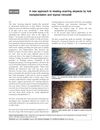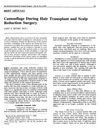 11 citations,
January 2010 in “Indian Journal of Dermatology, Venereology and Leprology”
11 citations,
January 2010 in “Indian Journal of Dermatology, Venereology and Leprology” Hair transplant and applying 5% minoxidil solution can effectively treat permanent hair loss, but it may change hair direction in some cases.
 11 citations,
January 1985 in “Archives of Dermatology”
11 citations,
January 1985 in “Archives of Dermatology” Topical antiandrogens might treat skin issues like hair growth, balding, and acne, but finding effective treatments without side effects is challenging.
 10 citations,
January 2007 in “Dermatologic Surgery”
10 citations,
January 2007 in “Dermatologic Surgery” Artificial hair fibers help treat scalp scars with few complications and a 20% yearly fiber fall rate.
 7 citations,
April 2021 in “British Journal of Dermatology”
7 citations,
April 2021 in “British Journal of Dermatology” Topical tofacitinib may effectively and safely regrow facial hair in some people with alopecia areata.
 7 citations,
September 2008 in “Dermatologic surgery”
7 citations,
September 2008 in “Dermatologic surgery” Hair transplantation can successfully treat stubborn alopecia areata.
 4 citations,
January 2016 in “Acta dermatovenerologica Alpina, Pannonica et Adriatica (Tiskana izd.)”
4 citations,
January 2016 in “Acta dermatovenerologica Alpina, Pannonica et Adriatica (Tiskana izd.)” 5% minoxidil foam is a safe, effective treatment for male pattern hair loss, with increased hair count and few side effects.
 3 citations,
January 2021 in “Skin appendage disorders”
3 citations,
January 2021 in “Skin appendage disorders” Hair loss can occur about 4 weeks after scalp surgery but usually grows back within 3 months without treatment.
3 citations,
September 2019 in “European Medical Journal” Scalp sarcoidosis can cause hair loss and needs accurate diagnosis and treatment with specific medications.
 3 citations,
March 2019 in “Fayoum University Medical Journal/Fayoum University Medical Journal ”
3 citations,
March 2019 in “Fayoum University Medical Journal/Fayoum University Medical Journal ” Rubbing calcipotriol on the skin works better than taking vitamin D pills for treating mild to moderate alopecia areata.
 2 citations,
January 2021 in “JAAD Case Reports”
2 citations,
January 2021 in “JAAD Case Reports” Using a special laser and skin medication together successfully cleared a skin condition in a pregnant woman.
 2 citations,
September 1997 in “Journal of The European Academy of Dermatology and Venereology”
2 citations,
September 1997 in “Journal of The European Academy of Dermatology and Venereology” Topical spironolactone effectively treats hair loss in women.
 2 citations,
June 1997 in “The American Journal of Cosmetic Surgery”
2 citations,
June 1997 in “The American Journal of Cosmetic Surgery” Scalp camouflage is important for patients to feel confident after hair surgery and can also help those with early hair loss.
 1 citations,
June 2017 in “Journal of The American Academy of Dermatology”
1 citations,
June 2017 in “Journal of The American Academy of Dermatology” Topical treatment SM04554 safely promotes hair growth in male baldness.
 May 2024 in “Clinical, cosmetic and investigational dermatology”
May 2024 in “Clinical, cosmetic and investigational dermatology” 5% topical minoxidil effectively treated a boy's congenital triangular alopecia without side effects.
 March 2024 in “Asian journal of medical sciences”
March 2024 in “Asian journal of medical sciences” Ring block anesthesia is the best method for PRP scalp injections due to low pain and high patient acceptance.
 December 2023 in “International journal of multidisciplinary research and analysis”
December 2023 in “International journal of multidisciplinary research and analysis” SH-MSCs gel can effectively treat alopecia by increasing IL-10 and decreasing TNF-α gene expression.
 September 2023 in “Clinical, cosmetic and investigational dermatology”
September 2023 in “Clinical, cosmetic and investigational dermatology” SLFC can improve scalp health and reduce sensitive scalp symptoms.
 September 2023 in “Medical lasers”
September 2023 in “Medical lasers” The botanical shampoo with Morus alba root extract is safe and effective for treating hair loss.
 January 2023 in “International Journal of Medicine in Developing Countries”
January 2023 in “International Journal of Medicine in Developing Countries” Topical minoxidil improved hair loss in a patient when used consistently.
 April 2022 in “Research Square (Research Square)”
April 2022 in “Research Square (Research Square)” The combination of laser and topical steroids is more effective for treating alopecia areata than topical steroids alone.
 October 2018 in “Springer eBooks”
October 2018 in “Springer eBooks” The document concludes that various topical medications are effective for skin conditions but often cause skin irritation as a side effect.
 August 2018 in “Journal of The American Academy of Dermatology”
August 2018 in “Journal of The American Academy of Dermatology” Aging significantly affects the hair and scalp of nonbalding Caucasian women, with changes that differ from male pattern baldness.

Men with both baldness and scalp psoriasis often don't have psoriasis on bald spots.
 January 2012 in “The Year book of dermatology”
January 2012 in “The Year book of dermatology” Many treatments for alopecia areata have inconsistent results; for under 10s, use minoxidil with a corticosteroid, and for over 10s, add ILC and consider diphenylcyclopropenone for widespread cases.
 January 2007 in “Dermatologic Surgery”
January 2007 in “Dermatologic Surgery” Artificial hair fibers help treat scalp scars with few complications and a 20% yearly fiber fall rate.
 March 2005 in “Journal of The American Academy of Dermatology”
March 2005 in “Journal of The American Academy of Dermatology” Two cosmetic lotions improved hair growth and had better cosmetic effects than 2% minoxidil.
 April 2004 in “Inpharma Weekly”
April 2004 in “Inpharma Weekly” Melatonin helps hair growth in women with hair loss issues.
 227 citations,
January 1998 in “Journal of Endocrinology”
227 citations,
January 1998 in “Journal of Endocrinology” Cells from balding scalps have more androgen receptors than cells from non-balding scalps.
 219 citations,
March 2004 in “Journal of The American Academy of Dermatology”
219 citations,
March 2004 in “Journal of The American Academy of Dermatology” 5% and 2% minoxidil solutions effectively promote hair growth and reduce hair loss, with 5% being slightly more effective but having more side effects.
 82 citations,
January 2002 in “Journal of drug targeting”
82 citations,
January 2002 in “Journal of drug targeting” Drugs penetrate scalp skin better than abdominal skin, with scalp hair follicles aiding in higher drug delivery.





























